英语修辞学
- 格式:pdf
- 大小:514.74 KB
- 文档页数:37
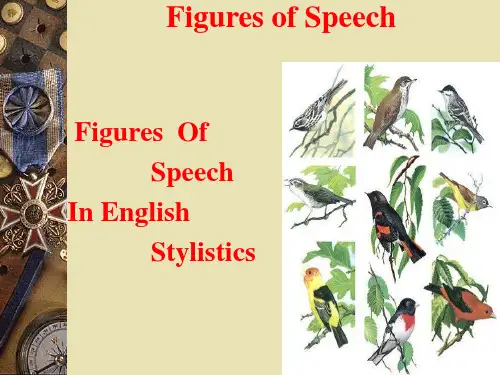
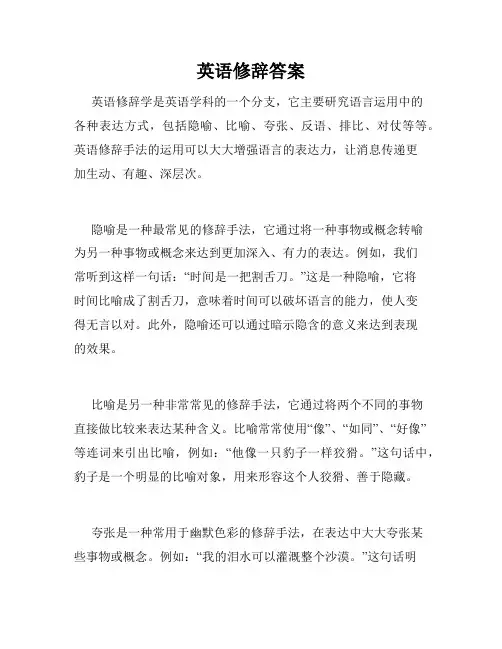
英语修辞答案英语修辞学是英语学科的一个分支,它主要研究语言运用中的各种表达方式,包括隐喻、比喻、夸张、反语、排比、对仗等等。
英语修辞手法的运用可以大大增强语言的表达力,让消息传递更加生动、有趣、深层次。
隐喻是一种最常见的修辞手法,它通过将一种事物或概念转喻为另一种事物或概念来达到更加深入、有力的表达。
例如,我们常听到这样一句话:“时间是一把割舌刀。
”这是一种隐喻,它将时间比喻成了割舌刀,意味着时间可以破坏语言的能力,使人变得无言以对。
此外,隐喻还可以通过暗示隐含的意义来达到表现的效果。
比喻是另一种非常常见的修辞手法,它通过将两个不同的事物直接做比较来表达某种含义。
比喻常常使用“像”、“如同”、“好像”等连词来引出比喻,例如:“他像一只豹子一样狡猾。
”这句话中,豹子是一个明显的比喻对象,用来形容这个人狡猾、善于隐藏。
夸张是一种常用于幽默色彩的修辞手法,在表达中大大夸张某些事物或概念。
例如:“我的泪水可以灌溉整个沙漠。
”这句话明显不是字面意义,而是通过夸张来表达这个人的悲伤情绪非常深刻,达到一种诗意的境界。
反语是一种很有冲击力的表达方式,通常是通过否定来表达肯定的意思。
例如:“你真是个聪明的笨蛋啊!”这句话明显是在夸奖,但是通过反话的方式来表达。
排比是一种常用于修辞的手法,它通过一连串重复的元素来达到强调效果。
例如,“她是聪明、优美、热情的音乐家。
”这句话通过三个并列的形容词来表达对这个音乐家才华的赞誉。
对仗是一种将词语进行对称排列的修辞手法,它通常用来表达一种对称、平衡的感觉。
例如:“今夜月色真美好,我想念你几分,你却来了二分。
”除了上述手法,还有一些其他的修辞手法,比如借代、比兴、拟人、讽刺等等。
这些手法的灵活运用可以大大提升英语语言的表达力,使得我们的言辞更加富有感染力和表现力,更好地传达信息和思想。
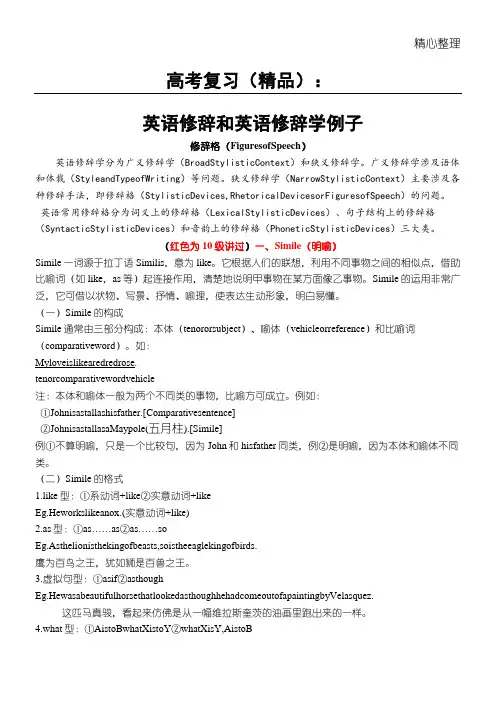
精心整理高考复习(精品):英语修辞和英语修辞学例子修辞格(FiguresofSpeech)英语修辞学分为广义修辞学(BroadStylisticContext)和狭义修辞学。
广义修辞学涉及语体和体裁(StyleandTypeofWriting)等问题。
狭义修辞学(NarrowStylisticContext)主要涉及各种修辞手法,即修辞格(StylisticDevices,RhetoricalDevicesorFiguresofSpeech)的问题。
英语常用修辞格分为词义上的修辞格((SyntacticStylisticDevices(红色为10级讲过Simile一词源于拉丁语Similis,意为like借助比喻词(如like,as的运用(一)Simile的构成Simile通常由三部分构成:本体((comparativeword)。
如:Myloveislikearedredrose.①②).[Simile]John和hisfather同类,例②是明喻,因为本体和喻体不同类。
(二)1.like+likeEg.Heworkslikeanox.(实意动词+like)2.as型:①as……as②as……soEg.Asthelionisthekingofbeasts,soistheeaglekingofbirds.鹰为百鸟之王,犹如狮是百兽之王。
3.虚拟句型:①asif②asthoughEg.HewasabeautifulhorsethatlookedasthoughhehadcomeoutofapaintingbyVelasquez.这匹马真骏,看起来仿佛是从一幅维拉斯奎茨的油画里跑出来的一样。
4.what型:①AistoBwhatXistoY②whatXisY,AistoB③whatAcallsB,XcallsYEg.Readingistothemindwhatexerciseistothebody.阅读之于思想,如同锻炼之于身体。
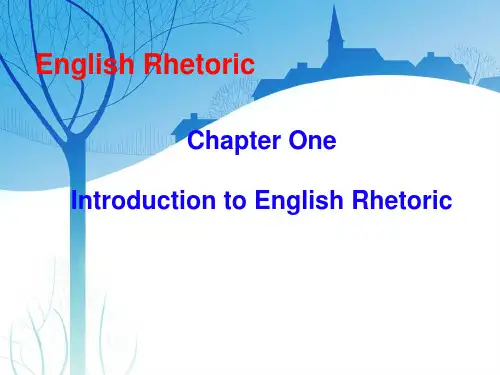
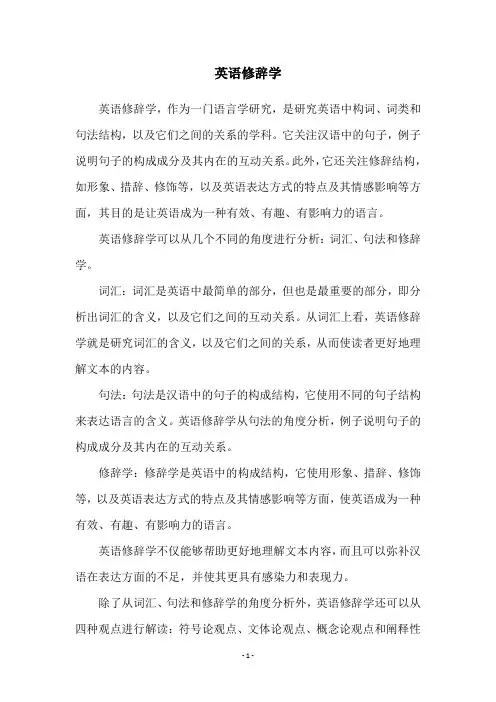
英语修辞学
英语修辞学,作为一门语言学研究,是研究英语中构词、词类和句法结构,以及它们之间的关系的学科。
它关注汉语中的句子,例子说明句子的构成成分及其内在的互动关系。
此外,它还关注修辞结构,如形象、措辞、修饰等,以及英语表达方式的特点及其情感影响等方面,其目的是让英语成为一种有效、有趣、有影响力的语言。
英语修辞学可以从几个不同的角度进行分析:词汇、句法和修辞学。
词汇:词汇是英语中最简单的部分,但也是最重要的部分,即分析出词汇的含义,以及它们之间的互动关系。
从词汇上看,英语修辞学就是研究词汇的含义,以及它们之间的关系,从而使读者更好地理解文本的内容。
句法:句法是汉语中的句子的构成结构,它使用不同的句子结构来表达语言的含义。
英语修辞学从句法的角度分析,例子说明句子的构成成分及其内在的互动关系。
修辞学:修辞学是英语中的构成结构,它使用形象、措辞、修饰等,以及英语表达方式的特点及其情感影响等方面,使英语成为一种有效、有趣、有影响力的语言。
英语修辞学不仅能够帮助更好地理解文本内容,而且可以弥补汉语在表达方面的不足,并使其更具有感染力和表现力。
除了从词汇、句法和修辞学的角度分析外,英语修辞学还可以从四种观点进行解读:符号论观点、文体论观点、概念论观点和阐释性
论观点。
综上所述,英语修辞学主要包括词汇、句法和修辞学三个方面,以及符号论、文体论、概念论和阐释性论四种观点。
它不仅可以帮助人们理解文本内容,同时也可以提高他们的表达能力。
正是由于英语修辞学的发展,使英语成为一种更加准确、有效、有趣的语言。
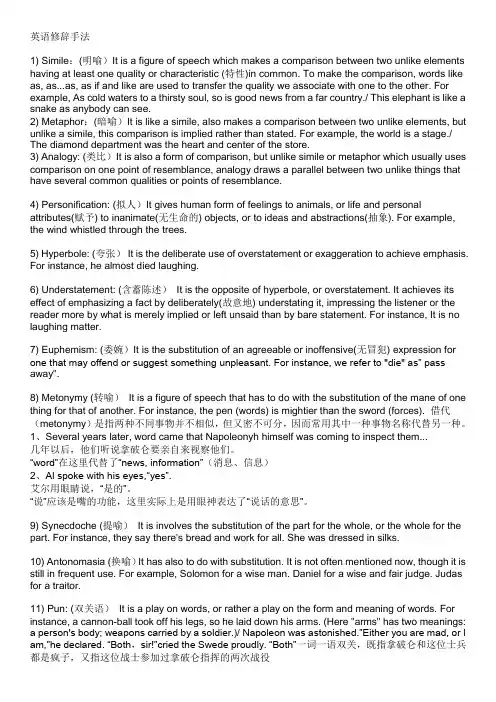
英语修辞手法1) Simile:(明喻)It is a figure of speech which makes a comparison between two unlike elements having at least one quality or characteristic (特性)in common. To make the comparison, words like as, as...as, as if and like are used to transfer the quality we associate with one to the other. For example, As cold waters to a thirsty soul, so is good news from a far country./ This elephant is like a snake as anybody can see.2) Metaphor:(暗喻)It is like a simile, also makes a comparison between two unlike elements, but unlike a simile, this comparison is implied rather than stated. For example, the world is a stage./ The diamond department was the heart and center of the store.3) Analogy: (类比)It is also a form of comparison, but unlike simile or metaphor which usually uses comparison on one point of resemblance, analogy draws a parallel between two unlike things that have several common qualities or points of resemblance.4) Personification: (拟人)It gives human form of feelings to animals, or life and personal attributes(赋予) to inanimate(无生命的) objects, or to ideas and abstractions(抽象). For example, the wind whistled through the trees.5) Hyperbole: (夸张)It is the deliberate use of overstatement or exaggeration to achieve emphasis. For instance, he almost died laughing.6) Understatement: (含蓄陈述)It is the opposite of hyperbole, or overstatement. It achieves its effect of emphasizing a fact by deliberately(故意地) understating it, impressing the listener or the reader more by what is merely implied or left unsaid than by bare statement. For instance, It is no laughing matter.7) Euphemism: (委婉)It is the substitution of an agreeable or inoffensive(无冒犯) expression for one that may offend or suggest something unpleasant. For instance, we refer to "die" as” pass away".8) Metonymy (转喻)It is a figure of speech that has to do with the substitution of the mane of one thing for that of another. For instance, the pen (words) is mightier than the sword (forces). 借代(metonymy)是指两种不同事物并不相似,但又密不可分,因而常用其中一种事物名称代替另一种。
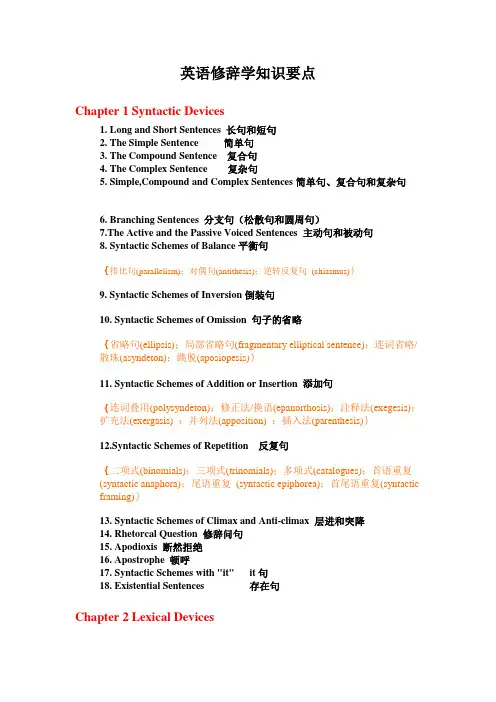
英语修辞学知识要点Chapter 1 Syntactic Devices1. Long and Short Sentences 长句和短句2. The Simple Sentence 简单句3. The Compound Sentence 复合句4. The Complex Sentence 复杂句5. Simple,Compound and Complex Sentences简单句、复合句和复杂句6. Branching Sentences 分支句(松散句和圆周句)7.The Active and the Passive Voiced Sentences 主动句和被动句8. Syntactic Schemes of Balance平衡句{排比句(parallelism);对偶句(antithesis);逆转反复句(chiasmus)}9. Syntactic Schemes of Inversion倒装句10. Syntactic Schemes of Omission 句子的省略{省略句(ellipsis);局部省略句(fragmentary elliptical sentence);连词省略/散珠(asyndeton);跳脱(aposiopesis)}11. Syntactic Schemes of Addition or Insertion 添加句{连词叠用(polysyndeton);修正法/换语(epanorthosis);注释法(exegesis);扩充法(exergasis) ;并列法(apposition) ;插入法(parenthesis)}12.Syntactic Schemes of Repetition 反复句{二项式(binomials);三项式(trinomials);多项式(catalogues);首语重复(syntactic anaphora);尾语重复(syntactic epiphorea);首尾语重复(syntactic framing)}13. Syntactic Schemes of Climax and Anti-climax 层进和突降14. Rhetorcal Question 修辞问句15. Apodioxis 断然拒绝16. Apostrophe 顿呼17. Syntactic Schemes with "it" it句18. Existential Sentences 存在句Chapter 2 Lexical Devices1.Lexical optionsShort words or long words 长短词Common words or learned words 普通词和书面词Formal,informal or colloquial words 正式词、非正式词和口语词General or specific words 一般词和特殊词Concrete or abstract words 具体词和抽象词Referential or emotive words 指称词和情感词Choice between synonymous words 近义词的选择2.choice of abbreviationsAcronyms 首字母缩略词ClippingsBlends 混合词3.Lexical repetitionImmediate repetition连接反复Lexical anaphora 首语反复Lexical epistrophe 尾语反复Symploce首尾语反复Anadiplosis链形反复distant or intermitten repetition间隔反复root repetition 词根反复ploce换义反复Chapter 3 Phonetic Devices and Prose Rhythm 1. Phonetic Devices语音词格Alliteration头韵Assonance元韵Consonance 辅韵Homeoteleuton谐缀格Onomatopoeia拟声Combined use of Phonetic Devices2. Prose Rhythm散文节奏Stress重音Pitch语调Pause and tempo停顿和语速Chapter 4 Figures of Speech1.Simile明喻2.Metaphor暗喻3.Analogy类比4.Personification\physicalification拟人\拟物5.Metonymy借代6.Synecdoche提喻7.Antonomasia换称8.Syllepsis一笔双叙9.Zeugma轭式搭配10.Paradox隽语11.Oxymoron矛盾修饰法12.Hyperbole夸张13.Understatement低调陈述14.Euphemism委婉语15.Irony反语16.Innuendo讥讽17.Sarcasm讽刺18.Transferred Epithet 移就19.Pun双关(antanaclasis语音双关;paronomasia语义双关)20.Epigram警句21.synesthesia通感22.palindrome 回文Chapter 5 Allusions典故的来源和改引。
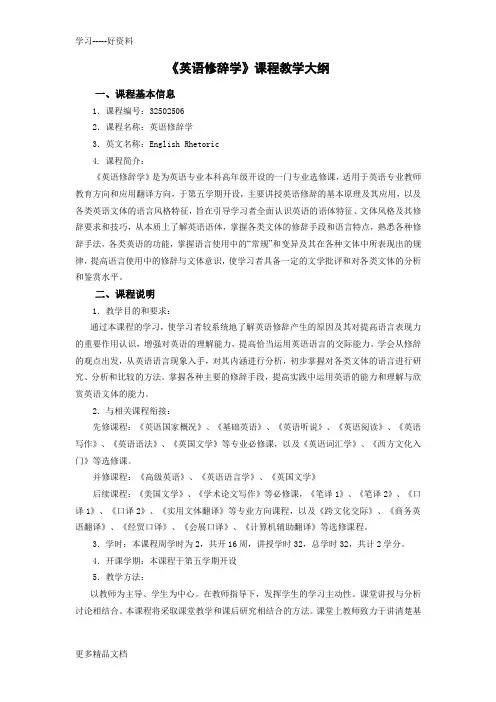
《英语修辞学》课程教学大纲一、课程基本信息1.课程编号:325025062.课程名称:英语修辞学3.英文名称:English Rhetoric4. 课程简介:《英语修辞学》是为英语专业本科高年级开设的一门专业选修课,适用于英语专业教师教育方向和应用翻译方向,于第五学期开设,主要讲授英语修辞的基本原理及其应用,以及各类英语文体的语言风格特征,旨在引导学习者全面认识英语的语体特征、文体风格及其修辞要求和技巧,从本质上了解英语语体,掌握各类文体的修辞手段和语言特点,熟悉各种修辞手法,各类英语的功能,掌握语言使用中的“常规”和变异及其在各种文体中所表现出的规律,提高语言使用中的修辞与文体意识,使学习者具备一定的文学批评和对各类文体的分析和鉴赏水平。
二、课程说明1.教学目的和要求:通过本课程的学习,使学习者较系统地了解英语修辞产生的原因及其对提高语言表现力的重要作用认识,增强对英语的理解能力,提高恰当运用英语语言的交际能力。
学会从修辞的观点出发,从英语语言现象入手,对其内涵进行分析,初步掌握对各类文体的语言进行研究、分析和比较的方法。
掌握各种主要的修辞手段,提高实践中运用英语的能力和理解与欣赏英语文体的能力。
2.与相关课程衔接:先修课程:《英语国家概况》、《基础英语》、《英语听说》、《英语阅读》、《英语写作》、《英语语法》、《英国文学》等专业必修课,以及《英语词汇学》、《西方文化入门》等选修课。
并修课程:《高级英语》、《英语语言学》、《英国文学》后续课程:《美国文学》、《学术论文写作》等必修课,《笔译1》、《笔译2》、《口译1》、《口译2》、《实用文体翻译》等专业方向课程,以及《跨文化交际》、《商务英语翻译》、《经贸口译》、《会展口译》、《计算机辅助翻译》等选修课程。
3.学时:本课程周学时为2,共开16周,讲授学时32,总学时32,共计2学分。
4.开课学期:本课程于第五学期开设5.教学方法:以教师为主导、学生为中心。

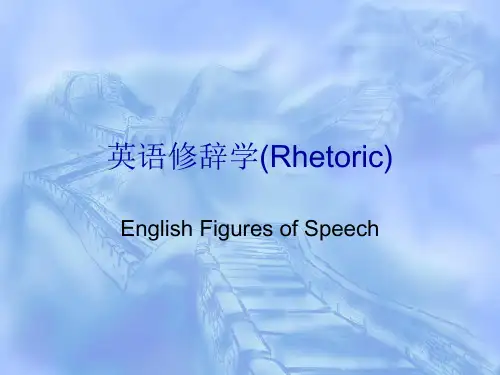
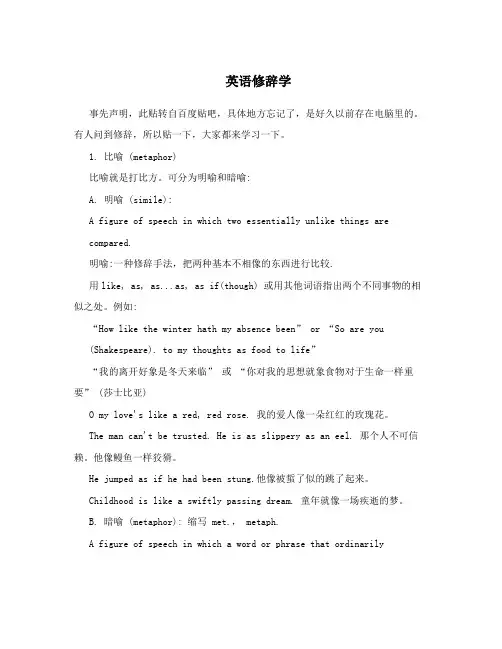
英语修辞学事先声明,此贴转自百度贴吧,具体地方忘记了,是好久以前存在电脑里的。
有人问到修辞,所以贴一下,大家都来学习一下。
1. 比喻 (metaphor)比喻就是打比方。
可分为明喻和暗喻:A. 明喻 (simile):A figure of speech in which two essentially unlike things arecompared.明喻:一种修辞手法,把两种基本不相像的东西进行比较.用like, as, as...as, as if(though) 或用其他词语指出两个不同事物的相似之处。
例如:“How like the winter hath my absence been” or “So are you(Shakespeare). to my thoughts as food to life”“我的离开好象是冬天来临” 或“你对我的思想就象食物对于生命一样重要” (莎士比亚)O my love's like a red, red rose. 我的爱人像一朵红红的玫瑰花。
The man can't be trusted. He is as slippery as an eel. 那个人不可信赖。
他像鳗鱼一样狡猾。
He jumped as if he had been stung.他像被蜇了似的跳了起来。
Childhood is like a swiftly passing dream. 童年就像一场疾逝的梦。
B. 暗喻 (metaphor): 缩写 met., metaph.A figure of speech in which a word or phrase that ordinarilydesignates one thing is used to designate another, thus making an implicitcomparison.用一个词来指代与该词所指事物有相似特点的另外一个事物。
英语修辞学Ⅰ. Phonetic figure of speech 语音修辞1.Alliteration 押头韵Bread not bombs.Cut crimes with jobs not jails.Time and tide waits for no man.2.Assonance 押元音Let us help you extend yourself.Could anything ever replace the taste of old grape and apple juice. Haste makes waste.Spend dime save your time.3.ConsonanceWomen don’t angonize,organize.Farms not arms.4.Aposiopesis 中间间断法Another step forward,you will…5.Pun 双关To Engla nd I will steal,and there I’ll steal.If we don’t hang together,we hang separately.On Sunday they pray for you,on Monday they prey on you.You earn your living.You urn your dead.Ⅱ.Syntactic figure of speech句法修辞1. Repetition 重复There is no,no,no,life.2. Anaphora 句首重复I want to know,I want to know who is the girl.3.Epiphora 句尾重复Reading makes a full man,conference a ready man and writing an exact man.4.Simploce 首尾重复Those who are toil to death,those who are worried to death,those who are bored to death.5.Parallelism 平行结构It was not anger,nor surprise,nor disapproval,nor horror,nor any of emotions that she has been prepared for.Kind hearts are the gardens,kind thoughts are the roots,kind words are the flowers,kind deeds are the fruits.6.Antithesis 对照It was the season of light,it was the season of darkness;it was the spring of hope,it was the winter of despair.When poverty comes in at the door,love flies out of at the window.7.Climax 高潮I came,I saw, I conquer.I was born American,I live American,I shall die American.8.Anticlimax 反高潮突降法Where shall I find hope,happiness,friends,cigarette,burp.9.Syllepsis 一语双叙He lost his coat and temper.She opened the door and her heart to the homeless child.10.Zeugma 轭式修饰法To make flying more comfortable,we want to great lenghths and great widths.11.Chiasmus 交错排列法One should eat to live not live to eat.For my thoughts are not your thoughts,neither are your wise are my wise.12.Rhetorical question 反问If winter comes,can sping be far behind?Ⅲ.Semantic figure of speech语意修辞1. Simile 明喻As cool as cucumber (泰然自若)Like a hen on the griddleWhat A is to B,C is to D.A fool can no more see his own folly than he can see his ears.Love and cough can not be hid.2. Metaphor 暗喻The world is a stage.All the world’s a stage,and all the men and women merely players. Money is a bottomless sea,in which honour,conscience and truth may be drowed.Some books are to be tasted,others to be swallowed,and some few to be chewed and digested.Books are the ever-burning lamps and wisdom.3.Personification 拟人Australia is so kind,just trickle her with a hoe and she laughs with a harvest.Laziness travels so slowly.4.Metonymy 转喻To read a Shakespeare or a Mark Twain is to eat a food full of protein. Without sweat,without bread.A hundred bayonet were marching.5.Synecdoche 提喻The farm is short of hands.There are hundreds of sails in the harbor.The prisoner is in irons.The poor man had six mouths to feed.China beat Japan at volleyball.6.Euphemism 委婉语His wife is expecting another child.7.Parody 仿写I had no outlook but an uplook rather.My place in society was at bottom.8.Synesthesia 共感The rooms on the first floor are cold color.9.Transfered epithet 移就I speak to him in hesitant French.A sleepless nightA happy dayⅣ.Logical figure of speech逻辑修辞1. Allusion 引喻He met his Waterloo in 1940s.2. Hyperbole 夸张I was destroyed fatigue.3.Irony 讽刺We’re luck it’s the other side on the 13th of December.That makes us feel real good.For instance the nuns who never take a bath without a bathrobe all the time,when asked why,since no man can see them they reply“Oh,but you forget the good God.”4.Oxymoron 矛盾修饰Bitter sweatVictorious defeatTrue lieLoyal deceitTearful joy5.Paradox 自相矛盾A strong man knows his weakness.6.Overstatement 高调论述Bob loves running risks,and he once dived from the overhanging cliff ,often thousand feet high into the sea.7.Understatement 低调论述He is no fool.That civil servant was not without ambition.。
《英语修辞学》课程教学大纲一、说明适用专业四年制本科英语专业语言文学方向先修课程高级英语总学时32总学分2(一)本课程的目的、要求(1)使学生较系统地了解英语修辞产生的原因及其对提高语言表现力的重要作用认识,增强对英语的理解能力,提高恰当运用英语语言的交际能力。
(2)使学生学会从修辞的观点出发,从英语语言现象入手,对其内涵进行分析,初步掌握对语言进行研究、分析和比较的方法。
(3)使学生掌握各种主要的修辞手段,提高实践中运用英语的能力和理解与欣赏英语文学作品的能力。
(二)内容选取和实施中注意的问题(1)本课程应坚持理论与实践相结合的原则,适当介绍修辞理论,重点讲述实用性内容,要求学生运用所学理论分析语言实例。
(2)突出重点、兼顾一般。
在选取内容上要注意以语音、词汇、句子三级修辞方法为重点,其中又应以喻类辞格为重点。
(3)学生对明喻比较熟悉,可以略而不讲或只作为隐喻的比较对象略谈。
(4)培养学生对语言的观察能力,让学生自己寻找例句并作出说明,以加深对所学内容的理解。
(5)大纲中不带“*”号的内容属于基本内容,带“*”号内容可讲可不讲。
(三)教学方法(1)教师为主导、学生为中心。
防止教师一言堂,要在教师指导下,发挥学生的学习主动性。
(2)理论与实践相结合,课堂讲授与学生分析讨论相结合。
(四)考核方式本课程为考查课程,采用口头与笔头相结合的方式:(1)口头方式主要以课堂提问和课堂讨论表现情况为考核依据。
(2)笔头方式主要以学生平时笔头作业完成情况和课程结束时笔头测验成绩为考核依据。
(3)口头考核成绩占40%,笔头考核成绩占60%。
(五)教学内容与学时分配教学章节教学内容学时安排备注1修辞学定义22西方修辞学简史44词语的选择35句子的选择27语音类修辞格48-9句法类修辞格610语义类修辞格611逻辑类修辞格4机动2测验二、大纲内容Chapter 1 What Is Rhetoric?1.1 Rhetoric and oratory1.2 Connotation of rhetoric1.3 Definitions of rhetoric1.4 Five assumptions说明和要求:(1)了解修辞与演说之间的关系(2)修辞学的定义Chapter 2 Brief History of Western Rhetoric2.1 Classical rhetoric (5th c. B.C.---5th c. A.D.)2.2 Rhetoric in the Middle Ages (5th---14th c.)*2.3 Rhetoric in the Renaissance (15th---16th c.)*2.4 New Classical Rhetoric (17th---19th c.)2.5 Contemporary Rhetoric说明和要求:(1)了解西方修辞学产生与发展的历史(2)了解亚里士多德等学者对西方修辞学的贡献(3)了解当今修辞学发展的现状和主要趋势Chapter 4 Choice of Words4.1 Use suitable words4.2 Denotation and connotation4.3 General words and specific words4.4 Abstract words and concrete words4.5 Short words and long words说明和要求:(1)了解词的本义与衍生义(2)了解概括词与特指词的语用功能(3)了解抽象词和具体词的语用功能(4)了解大词和小词的来源和对语体色彩的影响Chapter 5 Choice of Sentences5.1 Types of sentences5.2 Long and short sentences说明和要求:(1)了解不同句子结构的修辞作用(2)了解长句和短句的语用功能Chapter 7 Phonetic Figures of Speech7.1 Alliteration7.2 Assonance7.3 Consonance7.4 Onomatopoeia7.5 Aposiopesis7.6 Apostrophe7.7 Pun说明和要求:(1)本部分从语音在语言中的地位讲起,适当介绍语音学方面的知识,重点提示音韵法在诗歌中所起的重要作用及其对散文、广告等各语体的影响。
英语修辞学中文版简介英语修辞学是一门研究英语语言修辞现象和修辞技巧的学科。
在中文语境下,英语修辞学的研究和应用同样具有重要意义,可以帮助中文学习者更好地理解和应用英语语言技巧,提高语言表达能力。
本文将介绍英语修辞学的定义、历史背景、主要修辞手法以及在中文语境下的应用和意义。
一、英语修辞学的定义英语修辞学(English Rhetoric)是一门研究如何运用语言技巧来有效地表达思想、情感和观点的学科。
它涉及到语言的各个方面,包括词汇、语法、句子结构、篇章结构等。
英语修辞学不仅关注语言的表达形式,还关注语言的内容和效果,旨在通过恰当的语言手段来影响听众或读者的态度和行为。
二、英语修辞学的历史背景英语修辞学源于古希腊和罗马时代的古典修辞学,当时被广泛应用于法庭辩论、政治演讲和宗教仪式中。
随着时间的推移,修辞学逐渐发展成为一门独立的学科,并形成了不同的流派和理论体系。
现代英语修辞学开始于19世纪,随着语言学和文学研究的不断发展,修辞学逐渐成为一门跨学科的综合性学科,与语言学、文学、心理学、社会学等多个领域产生了密切的联系。
三、英语修辞学的主要修辞手法1.比喻(Metaphor): 通过将一个事物比喻为另一个事物来表达某种意象或概念。
比喻可以分为明喻和暗喻两种形式。
明喻是直接将一个事物比喻为另一个事物,而暗喻则是暗示一个事物具有另一个事物的特征或性质。
2.拟人(Personification): 将非人类的事物赋予人类的特征或情感,使其形象更加生动。
例如,“春天是一位温柔的姑娘,给大地披上五彩斑斓的衣裳。
”3.夸张(Hyperbole): 通过夸大或缩小事物的特征来强调某种情感或效果。
例如,“他饿得像一只三天没吃饭的老虎。
”4.反语(Irony): 通过说反话或使用讽刺的方式来表达与字面意思相反的含义。
例如,“你真是个天才,居然在考试前一天才开始复习。
”5.排比(Parallelism): 通过使用结构相似或意义相近的词语或句子来增强语言的表现力和节奏感。
英语修辞学中20种常见修辞格名称双语释义及举例(Bilingual definitions and examples of 20 common rhetorical names inEnglish Rhetoric)20 common rhetorical name in English rhetoric bilingual definitions and examples (2012-04-27 21:08:55) reprint we label: reproduced classification: English MajorsOriginal address: bilingual definitions and examples of 20 commonly used rhetorical figures in English Rhetoric: Author: Jiang JiangFLTRP Cup English debate in English Rhetoric: how to say? 1.Simile 2.Metaphor metaphor, simile; metaphor; metonymy3.Metonymy;4. Synecdoche5. Synaesthesia synaesthesia synecdoche;6. Personification7. Hyperbole; personification; exaggeration;8. Parallelism alignment;9. Euphemism euphemism, euphemism; 10. Allegory 11. Irony 12. allegory; irony; Pun pun;13. Antithesis / / even than the controlBilingual definitions and examples of 20 common rhetorical names in English RhetoricThe use of figures of speech in English (three)What is a figure of speech?Figures of speech is the language art to improve the effect of language expression. It can make the language vivid and vivid, and give people the enjoyment of beauty. In order to translate English figures of speech, we should first make clear itscharacteristics, make clear the similarities and differences between the two languages in English and Chinese, and then use appropriate skills to translate them according to the specific situation. A lot of English rhetoric, but roughly divided like can be divided into phonetic rhetoric, rhetorical devices and syntactical rhetorical devices.(1) devices rhetorical (phonological)As the name suggests, phonological figures of speech are rhetorical devices created by the phonetic features of words. It mainly includes onomatopoeia, alliteration and assonance.1. the onomatopoeia figure Onomatopoeia is a rhetorical device imitating the sounds produced by things, which is exactly the same as Chinese onomatopoeia. The proper use of it can make the language more vivid. Such as:Presently there came the click of high-heeled shoes. heels presently there came the click of.2. Alliteration is in a alliterative phrase or a verse, there are more than two words close to each other, the first syllable (or other syllable) with letters or sound the same;3. yuan / abdominal rhyme rhyme assonance? As (ns]? N)? In a word or in the middle of a line, there are two or more words with the same vowel. The former Chinese and two (two or more syllables in Chinese, the same initials, called dual sound, it is not similar to the figures) and Chinese Poems (two or more syllables are very similar to each other the same final). Forexample:(1) Peter Piper picked a peck of picking pepper. (alliteration) Peter. Peter Piper picked a peck of picking pepper.(2) With this faith we will be able to hew out of the mountain of despair a stone of hope. (assonance), with this faith, we can chisel the mountain of despair into a rock of hope.(two) devices rhetorical (semantic)Figures of speech are created mainly by means of semantic association and linguistic changes. They mainly include:Simile, metaphor, allusion, metonymy, transferred epithet, personifi-cation, hyperbole, irony, euphemism, pun, oxymoron, zeugma, contrast, et al.A. simile, metaphor; allusionSimile and Chinese similes are basically the same, the use of a certain things or situations to match another thing or situation. The body and Yu Tijun appear in the same sentence, in the form of corresponding. The English Simile metaphor is usually like, as...... As), Chinese Simile metaphor is usually "like" and "like" etc.. For example:他们就像街上的有轨电车。
英语修辞学(Rhetoric) English Figures of Speech英语修辞的一般规律与特点General principles and features of English rhetoric▪1.关系词丰富,介词、连词、关系代词和关系副词等的充分利用,使英语成为一种更为形式的语言,即以形合为主的语言。
而汉语是以意合为主的语言。
That is our policy and that is our declaration.▪这就是我们的国策。
这就是我们的宣言。
▪If winter comes,can spring be far behind?▪冬天来了,春天还会远吗?▪This is the reason why he is leaving so soon.▪这就是他所以这么快就要离开的原因。
▪ 2.英语名词用得多,汉语动词用得多。
因此,从总体修辞效果上看,英语呈静态,汉语呈动态。
▪I fell madly in love with her,and she–with me.▪我疯狂地爱上了她,她也疯狂地爱上了我。
▪A woman with fair opportunities,and without an absolute hump may marry whom she likes.▪一个女人只要不是驼背驼得厉害,机会好的话,想嫁给谁就嫁给谁。
▪Laser is one of the most sensational developments in recent years,because of its applicability to many fields of science and its adaptability to practical uses.▪激光可以应用于许多科学领域,又适合于各种实际用途,因此成了近年来轰动一时的科学成就之一。
▪ 3.英语有“物称倾向”,即主语往往是表示无生命物体的名词或表示事物的名词词组。
汉语则有明显的“人称倾向”,即句子的主语往往是人或有生命的东西。
▪My heart went out to the old warrior as spectators pushed by him to shake Darrow’s hand.▪观众从他身边挤过去争相与达罗握手时,我很同情这位久经沙场的老将。
▪Bitterness fed on the man who had made the world laugh.▪这位曾使全世界的人发出笑声的人自己却饱受辛酸。
▪The sight of his native place called back his childhood.▪见到自己的故乡,他想起了童年的情景。
▪The old man’s death was calm and peaceful.▪(那位)老人死得很安详。
▪ 4.英语被动句用得多,汉语主动句用得多。
这更说明了英语的“物称倾向”。
▪An illustration is furnished by an editorial in the Washington Post(January17,1962).▪《华盛顿邮报》(1962年1月17日)的一篇社论提供了一个例子。
▪It has been known for a long time that there is a first relationship between the heart and liver.▪长期以来,大家知道心脏和肝脏的关系是最重要的。
▪The challenge from the Third World has always been foreseen by our shipping companies.▪我国的海运公司总能预见来自第三世界的挑战。
▪ 5.英语多用长句和复合句。
▪With the gaining of our political freedom you will remember that there came a conflict between the point of view of Alexander Hamilton, sincerely believing in the superiority of government by a small group of public-spirited and usually wealthy citizens,and,on the other hand,the point of view of Thomas Jefferson,and advocate of government by representatives chosen by all the people,and advocate of the universal right of free thought and free personal living and free religion and free expression of opinion and,above all,the right of free universal suffrage.▪想必你们还记得,在我们获得政治自由之后,亚历山大·汉密尔顿和托马斯·杰弗逊两人在观点上发生了分歧。
汉密尔顿对于由一小群热心公益且往往有钱的公民掌管的政府的优越性坚信不疑。
杰弗逊则主张政府必须由全民选出的代表掌管。
他还主张公民普遍享有思想自由、居住自由、宗教自由和言论自由的权利,特别是享有普选权利。
▪ 6.英语大量使用抽象名词,这类名词涵义概括,指称笼统,覆盖面广,往往有一种“虚”、“泛”、“暗”、“曲”、“隐”的魅力,因而便于用来表达复杂的思想和微妙的情绪。
▪The signs of the times point to the necessity of themodification of the system of administration.▪管理体制需要改革,这已越来越清楚了。
▪No year passes now without evidence of the truth ofthe statement that the work of government isbecoming increasingly difficult.▪行政管理工作已变得越来越困难了,每年都证明确实如此。
What is Rhetoric?Why Do We Learn Rhetoric?▪To understand the author’s intention better.▪To find out the common ways people know the world and ways people express themselves.▪To appreciate the beauty, explicit or not, of the language.▪To learn how to achieve an effective communication.Division of Rhetoric▪Communicative Rhetoric 交际修辞(Negative Rhetoric 消极修辞)--To add to people’s knowledge; accurate, plain;▪Aesthetic Rhetoric 美学修辞(Positive Rhetoric 积极修辞)--To get people affected, or moved; vivid, brilliant, colorful.一、语义修辞1明喻(simile)俗称直喻,是依据比喻和被比喻两种不同事物的相似关系而构成的修辞格。
1.The snow was like a white blanket drawn over the field.2.He was like a cock who thought the sun had risen to hear him crow.认真观察以上各例,我们会发现它们的特点,由(as)... as, like等引导,这些引导词被称作比喻词(acknowledging word),它们是辨别明喻的最显著的特征,明喻较为直白,比喻物和被比喻物之间相似点较为明显,所以明喻是一种比较好判断的修辞手。
1. Simile(明喻)▪拉丁语similis (like)▪1.three parts :subject(主体)reference(喻体)indicator of resemblance(比喻词)▪My love is like a red red rose.▪2。
主体和喻体一般指两个不同的事物。
▪John is as tall as a Maypole.五朔节花柱(庆祝五朔节围绕此柱歌舞)▪五朔节欧洲传统民间节日。
用以祭祀树神、谷物神、庆祝农业收获及春天的来临。
历史悠久,最早起源于古代东方,后传至欧洲。
每年5月1日举行。
五朔节前夕,在英国、法国、瑞典的一些地区,人们通常会在家门前插上一根青树枝或栽一棵幼树,并用花冠、花束装饰起来。
少女们手持树枝花环,挨家挨户去唱五朔节赞歌,祝福主人。
在一些农村,每年5月1日凌晨,青年们便奏着音乐、唱着赞歌,结伴去树林砍树枝,待太阳出来后返回,将树枝插在门窗上。
▪What is simile? E.g.▪The snow was like a white blank drawn over the field.▪The structure:▪The signified, the simile marker, and the signifier ▪本体, 比喻词, 喻体The three uses of similes:▪Descriptive描述型明喻;▪Illuminative启示型明喻;▪Illustrative说明型明喻;▪;Descriptive 描述型▪Her lips were red, her locks were yellow as gold.▪Pop looked so unhappy, almost like a child who’s lost his piece of candy.▪The big black flies hit us like bombs.Illustrative说明型▪E.g. What is tennis?▪Tennis is like a pingpong game scaled up to a sizable court.▪Its function is to explain abstract or complicated ideas or things unfamiliar to you in simple, concrete ideas, or things familiar to you.Illuminative启发型▪E.g.▪What happened to a dream deferred (postponed)?Like a raisin (葡萄干) in the sun?Or fester (化脓) like a sore?Does it stink like a rotten meat?▪Its function is to give deeper insight into persons or pare the following sentences:▪Jim looks like his brother Billy.▪My car runs as fast as the train.▪A real friend is like a mirror that can help you see any dirt on your face.▪Life was like a journey full of pitfalls.▪--(The first two sentences are not cases of simile.) Simile is a comparison between two unlike things across domains (跨领域).Like and as型▪Marriage is like a beleaguered fortress; those who are without want to get in, and those within want go get out .▪婚姻象是一个被包围的堡垒;外面的想要进去,里面的人想要出来。